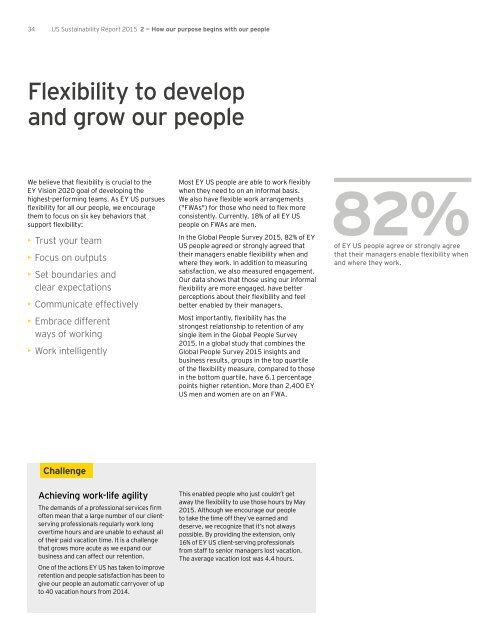EYUSSustainabilityReport2015
Create successful ePaper yourself
Turn your PDF publications into a flip-book with our unique Google optimized e-Paper software.
34<br />
US Sustainability Report 2015 2 — How our purpose begins with our people<br />
Flexibility to develop<br />
and grow our people<br />
We believe that flexibility is crucial to the<br />
EY Vision 2020 goal of developing the<br />
highest-performing teams. As EY US pursues<br />
flexibility for all our people, we encourage<br />
them to focus on six key behaviors that<br />
support flexibility:<br />
• Trust your team<br />
• Focus on outputs<br />
• Set boundaries and<br />
clear expectations<br />
• Communicate effectively<br />
• Embrace different<br />
ways of working<br />
• Work intelligently<br />
Most EY US people are able to work flexibly<br />
when they need to on an informal basis.<br />
We also have flexible work arrangements<br />
("FWAs") for those who need to flex more<br />
consistently. Currently, 18% of all EY US<br />
people on FWAs are men.<br />
In the Global People Survey 2015, 82% of EY<br />
US people agreed or strongly agreed that<br />
their managers enable flexibility when and<br />
where they work. In addition to measuring<br />
satisfaction, we also measured engagement.<br />
Our data shows that those using our informal<br />
flexibility are more engaged, have better<br />
perceptions about their flexibility and feel<br />
better enabled by their managers.<br />
Most importantly, flexibility has the<br />
strongest relationship to retention of any<br />
single item in the Global People Survey<br />
2015. In a global study that combines the<br />
Global People Survey 2015 insights and<br />
business results, groups in the top quartile<br />
of the flexibility measure, compared to those<br />
in the bottom quartile, have 6.1 percentage<br />
points higher retention. More than 2,400 EY<br />
US men and women are on an FWA.<br />
82%<br />
of EY US people agree or strongly agree<br />
that their managers enable flexibility when<br />
and where they work.<br />
Challenge<br />
Achieving work-life agility<br />
The demands of a professional services firm<br />
often mean that a large number of our clientserving<br />
professionals regularly work long<br />
overtime hours and are unable to exhaust all<br />
of their paid vacation time. It is a challenge<br />
that grows more acute as we expand our<br />
business and can affect our retention.<br />
One of the actions EY US has taken to improve<br />
retention and people satisfaction has been to<br />
give our people an automatic carryover of up<br />
to 40 vacation hours from 2014.<br />
This enabled people who just couldn’t get<br />
away the flexibility to use those hours by May<br />
2015. Although we encourage our people<br />
to take the time off they’ve earned and<br />
deserve, we recognize that it’s not always<br />
possible. By providing the extension, only<br />
16% of EY US client-serving professionals<br />
from staff to senior managers lost vacation.<br />
The average vacation lost was 4.4 hours.



